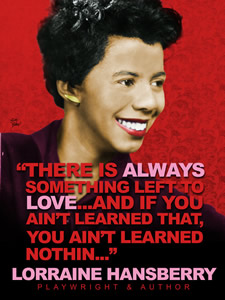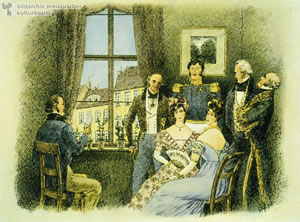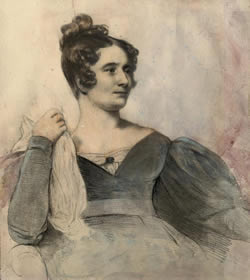De Amerikaanse schrijfster Lorraine Hansberry werd geborenop 19 mei 1930 in Chigago. Zie ook alle tags voor Lorraine Hansberry op dit blog.
Uit: A Raisin in the Sun
“Mama: It don’t sound nice for a young girl to say things like that — you wasn’t brought up that way. Me and your father went to trouble to get you and Brother to church every Sunday.
Beneatha: Mama, you don’t understand. It’s all a matter of ideas, and God is just one idea I don’t accept. It’s not important. I am not going out and be immoral or commit crimes because I don’t believe in God. I don’t even think about it. It’s just that I get tired of Him getting credit for all the things the human race achieves through its own stubborn effort. There simple is no blasted God — there is only man and it is he who makes miracles!
(MAMA absorbs this speech, studies her daughter and rises slowly and crosses to BENEATHA and slaps her powerfully across the face. After, there is only silence and the daughter drops her eyes from her mother’s face, and MAMA is very tall before her)
Mama: Now — you say after me, in my mother’s house there is still God. (There is a long pause and BENEATHA stares at the floor wordlessly. MAMA repeats the phrase with precision and cool emotion) In my mother’s house there is still God.
Beneatha: In my mother’s house there is still God. (A long pause)”

De Duitse schrijver en vertaler Fritz Rudolf Fries werd geboren op 19 mei 1935 in Bilbao als zoon van een Duitse koopman. Zie ook alle tags voor Fritz Rudolf Fries op dit blog.
Uit: Last Exit to El Paso
„Es dunkelte schon, als das Telefon klingelte.
Der Mann in seinem Bett, seine Tage sind gezählt nach Ansicht der Ärzte, drückt die grüne Taste an seinem Mobiltelefon. Altmodisch, wie er zu sein glaubt, verweigert er sich einer eskalierenden Technik. Bevor er sich mit heiserer Altmännerstimme meldet, berührt seine Hand den warmen Leib seines Enkels Fabius. Schlaftrunken, aber aufmerksam für die Geräusche im weiten Haus wartet das Kind auf das Märchen, das sein Großvater heute für es ausgesucht hat. Es muss ein kurzes Märchen sein, denn vor der Tür steht schon Kathleen, Großvaters Pflegeschwester, Sekretärin, Haushälterin, um das Kind ins Bett zu bringen. Während das Telefon klingelt, beobachtet Fabius den Flug der Obstfliegen um die matt scheinende Deckenlampe, eine Art Weltkugel aus japanischem Papier. Die Fliegen jagen einander, balgen sich wie junge Katzen, retten sich auf die Verstrebungen der Lampe, die im Windhauch aus dem spaltweit geöffneten Fenster schaukelt.
Der alte Mann in seinem Bett meldet sich ein zweites Mal. Eine eilige Stimme, Mann oder Frau, fragt: Spreche ich mit Herrn Pierre Arronax, ja, herzlichen Glückwunsch, Herr Arronax! Sie haben eine Weltreise gewonnen! Wir melden uns in wenigen Minuten wieder, nehmen Sie Papier und Bleistift zur Hand, wir rufen an …!
Blödsinn, denkt der alte Mann, woher wissen sie meinen Namen, der dazu noch ein Pseudonym ist aus der Zeit, da er sich mit Jules Verne beschäftigte. Er? Eine Weltreise, in achtzig Tagen? Da er schon heute ein toter Mann ist?“

De Duitse schrijfster Rahel Varnhagen werd geboren op 19 mei 1771 in Berlijn. Zie ook alle tags voor Rahel Varnhagen op dit blog.
Uit: Gedanken, Beobachtungen und Erinnerungen
„Mit dem Alter, mit jedem halben Tag, werd ich der Verstellung unfähiger. Und oh! wie richtig das. Mein ewiges Denken macht mir alles schneller klar als sonst, und in mir graben hat mich empfindlicher gemacht, als die freigebige Natur selbst es beabsichtigte.
Nichts ist odiöser, als sich hinter Ignoranz verstecken, weil es zärtlich gegen sich selbst und roh gegen die andern und eine ungeschickte Lüge ist, und diese Komposition die schlechteste Art von Nichtswürdigkeit ist.
An der Seele zimmert jeder ordentliche Mensch, solange er lebt.
Mit dem Schicksal bin ich nicht »ausgesöhnter«; ich denke schon länger, es gibt keins. Es gibt ein Universum, in dem entwickeln wir uns; und es ist ganz gleich, welches Schicksal wir haben, wenn wir zu Sinne gekommen sind; die Entwicklung ist unser Schicksal.
Nun hab ich auch erfunden, was ich am meisten hasse: Pedanterie; sie setzt ganz notwendig Leere voraus: und hält sich deshalb fest an Formen. Ist sie von der bessern Art, so tut sie dies im halben Gefühl dieser Leere mit Rechtschaffenheit; ist sie aber von der schlechten, so tut sie es mit Stolz und Prahlerei, nicht ahnend und zugebend, daß etwas anderes existiere.
Es kann also nichts Unleidlicheres geben, als diese Stupidität im völligen Marsch begriffen zu sehen: wie Narrheit, anmaßend und langweilig: gar nicht zum Ertragen! Was mich aber empört, ist diese Klasse, die mit Prätension sittlich!!! sind.”

Geselligkeit bei Rahel Varnhagen. Gekleurde ets door Erich M. Simon, ongedateerd
De Britse schrijfster Anna Jameson werd geboren op 17 mei 1797 in Dublin. Zie ook alle tags voor Anna Jameson op dit blog.
Uit: The Diary of an Ennuyée
“July 27. — A conversation with S** always leaves me sad. Can it then be possible that he is right? No — O no! my understanding rejects the idea with indignation, my whole heart recoils from it; yet if it should be so! what then: have I been till now the dupe and the victim of factitious feelings? virtue, honour, feeling, generosity, you are then but words, signifying nothing? Yet if this vain philosophy lead to happiness, would not S** be happy? it is evident he is not. When he said that the object existed not in this world which couldlead him twenty yards out of his way, did this sound like happiness? I remember that while he spoke, instead of feeling either persuaded or convinced by his captivating eloquence, I was perplexed and distressed; I suffereda painful compassion, and tears were in my eyes. I, who so often have pitied myself, pitied him at that moment a thousand times more; I thought, I would not buy tranquillity at such a price as he has paid for it. Yet if he should be right? that if, which every now and then suggests itself, is terrible; it shakes me in the utmost recesses of my heart.
S, in spite of myself, and in spite of all that with most perverted pains he has made himself (so different from what he once was), can charm and interest, pain and perplex me: — not so D, another disciple of the same school: he inspires me with the strongest antipathy I ever felt for a human being. Insignificant and disagreeable is his appearance, he looks as if all the bile under heaven had found its way into his complexion, and all the infernal irony of a Mephistopheles into his turned – up nose and insolent curled lip.”

Anna Jameson (17 mei 1794 – 17 maart 1860)
Anoniem portret
